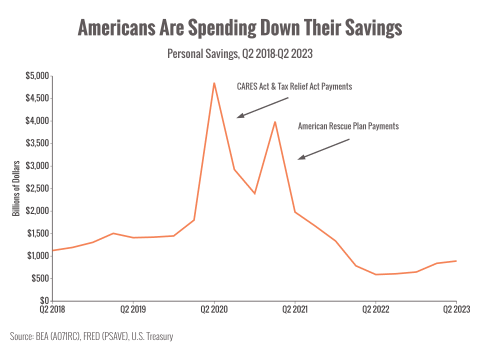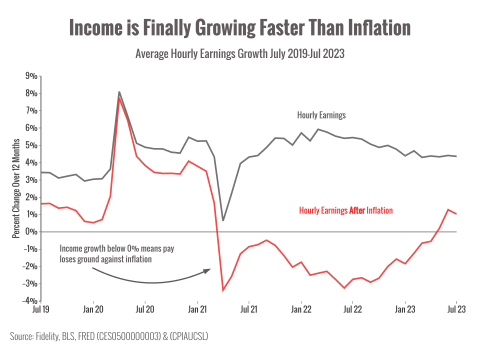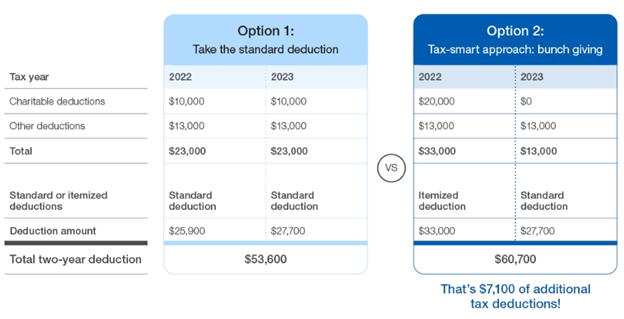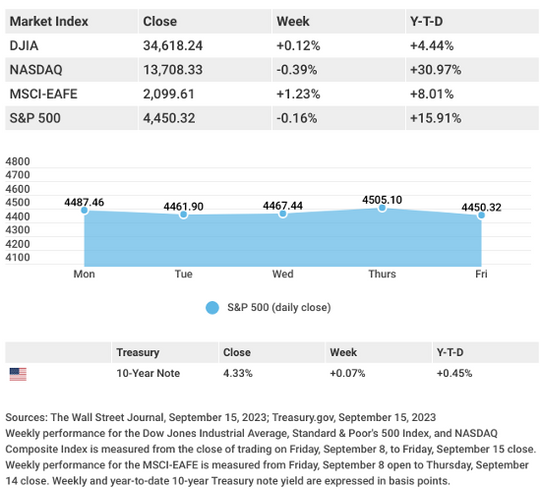Americans Spending? (Recession Warning)

Is a new recession warning flashing?
Let’s discuss.
You've probably heard us say that consumers (like us) are the backbone of the U.S. economy.
It's true.
Consumer spending accounts for nearly 70% of economic growth.
It's been the engine of the pandemic recovery and has played a large part in calming recession fears.
As long as Americans still spend on things like cars, houses, birthdays, and trips abroad, they create a significant tailwind against recession risks.
You can probably hear the "but" coming.
Here it is:
The latest data shows that consumer spending may be slowing as Americans become less willing to open their wallets.1
While Americans went big on "revenge spending" on vacations, concerts, and the in-person experiences we missed out on during the pandemic years, the party may be winding down.
There are a few seasonal reasons that could explain the slowdown.
Students just returned to school and summer vacations have mostly wrapped up.
Student loan repayments begin next month for millions of Americans.2
However, analysts think some bigger trends could be at work, potentially foretelling a spending deceleration in the critical final months of the year.
Here's one:
Americans are drawing down their post-pandemic savings at a rapid rate.
While Americans overall still have billions in savings, it's an economic trend we're watching.
At the same time, it's getting harder to access credit.
According to a summer survey, rejection rates for credit applications (including credit cards, auto loans, and mortgages) have increased sharply in the last few months, especially for people with lower credit ratings.3
Since these folks likely have the least savings, it's a potential distress signal for financially fragile consumers.
However, there's a bright spot that could help prop up American spending.
Income growth is finally outpacing inflation.
That means Americans have more money in their wallets after inflation. That's good news for spending.
How could consumer spending trends affect markets?
Markets seem to be in mostly neutral territory, without any strong moves toward optimism or pessimism.
If concern about recession headwinds flares, it could cause a pullback. Conversely, if optimism about economic tailwinds bubbles up, we could see further strength in the bull run.
Either way, we’ll be watching and keeping you updated.
Until next week,
Your Eagle Wealth Team
P.S. Student loan forgiveness scams are surging, unfortunately. Please be sure to verify all information through official sites like studentaid.gov and be on alert for false urgency and too-good-to-be-true promises.

Consider ‘Bunching’ Your Giving
When it comes to giving to your favorite causes and organizations, in many ways, how you give can be just as important as what you give.
Take “bunching,” for instance. In this giving strategy, you make larger donations in certain years rather than giving smaller amounts every year in order to surpass the standard deduction threshold.
Bunching allows you to itemize deductions in specific years, maximizing the tax benefits of your charitable giving, allowing you to make the most of your charitable contributions and reduce your overall tax liability over time.
Here’s an example of how this could look.
You can read more about bunching here. As always, please give us a call if you’d like to learn more.
Source : https://www.schwabcharitable.org/bunching-charitable-contributions
(Please consult with a tax professional for guidance tailored to your specific financial situation & the latest tax laws.)

The Week on Wall Street
Stocks ended the week roughly where they began as investors digested a mixed set of new economic data.
The Dow Jones Industrial Average gained 0.12%, while the Standard & Poor’s 500 slipped 0.16%. The Nasdaq Composite index fell 0.39% for the week. The MSCI EAFE index, which tracks developed overseas stock markets, added 1.23%.4,5,6
Stocks Struggle For Direction
Stocks traded around the flatline without any catalyst in either direction. On Thursday, investors welcomed the European Central Bank, signaling its rate-hiking campaign may be nearing its conclusion and a successful IPO that revived optimism in the capital markets. Investors also cheered a stronger-than-forecast retail sales report and a modest increase in core producer prices, overlooking a higher-than-expected headline number.
But sentiment quickly reversed on Friday as a drop in consumer confidence, troubling news in the semiconductor space, and a labor strike at the nation’s major automakers dented Thursday’s optimism, sending major averages to a mixed close for the week.
Inflation Progress Stalls
Surging gasoline prices drove August’s inflation rate to its highest monthly rate this year, rising 0.6%, while the year-over-year Consumer Price Index posted a 3.7% increase, up from July’s 3.2% annual rate. Core inflation (excludes energy and food) was more encouraging, rising 4.3%-- down from July’s reading of 4.7%.7
Producer prices also came in higher than expected, rising 0.7% in August, above the estimate of a 0.4% increase and the biggest monthly gain since June 2022. The year-over-year increase was a more modest 1.6%. Gasoline prices significantly contributed to the month’s jump; excluding food and energy, prices aligned with forecasts, ticking up 0.2% in August.8
Any companies mentioned are for informational purposes only, and this should not be considered a solicitation for the purchase or sale of their securities. Any investment should be consistent with your objectives, time frame, and risk tolerance
Advisory Services offered through My Legacy Advisors, LLC dba Eagle Wealth Management, a registered investment advisor. Confidential Information: This message and any attachments contain information from Eagle Wealth Management, which may be confidential and/or privileged and is intended for use only by the addressee(s) named on this transmission. If you are not the intended recipient, or the employee or agent responsible for delivering the message to the intended recipient, you are notified that any review, copying, distribution or use of this transmission is strictly prohibited. If you have received this transmission in error, please (i) notify the sender immediately by e-mail or by telephone and (ii) destroy all copies of this message.
1. https://www.cnn.com/2023/09/07/economy/revenge-travel-decline-spending-splurge/index.html
2. https://www.cnn.com/2023/08/31/politics/student-loan-payments-resume/index.html
3. https://www.newyorkfed.org/microeconomics/sce/credit-access
Chart Sources:
Chart 1: https://fred.stlouisfed.org/series/PSAVE#0 and https://home.treasury.gov/policy-issues/coronavirus/assistance-for-american-families-and-workers/economic-impact-payments
Chart 2: https://www.fidelity.com/learning-center/trading-investing/are-we-in-a-recession, https://fred.stlouisfed.org/series/CES0500000003#0 and https://fred.stlouisfed.org/series/CPIAUCSL. Inflation-adjusted income calculated as Hourly Earnings/CPI for all periods.
4. The Wall Street Journal, September 15, 2023.
5. The Wall Street Journal, September 15, 2023.
6. The Wall Street Journal, September 15, 2023.
7. The Wall Street Journal, September 13, 2023.
8. CNBC, September 14, 2023.
Investing involves risks, and investment decisions should be based on your own goals, time horizon, and tolerance for risk. The return and principal value of investments will fluctuate as market conditions change. When sold, investments may be worth more or less than their original cost.
The forecasts or forward-looking statements are based on assumptions, may not materialize, and are subject to revision without notice.
The market indexes discussed are unmanaged, and generally, considered representative of their respective markets. Index performance is not indicative of the past performance of a particular investment. Indexes do not incur management fees, costs, and expenses. Individuals cannot directly invest in unmanaged indexes. Past performance does not guarantee future results.
The Dow Jones Industrial Average is an unmanaged index that is generally considered representative of large-capitalization companies on the U.S. stock market. Nasdaq Composite is an index of the common stocks and similar securities listed on the NASDAQ stock market and is considered a broad indicator of the performance of technology and growth companies. The MSCI EAFE Index was created by Morgan Stanley Capital International (MSCI) and serves as a benchmark of the performance of major international equity markets, as represented by 21 major MSCI indexes from Europe, Australia, and Southeast Asia. The S&P 500 Composite Index is an unmanaged group of securities that are considered to be representative of the stock market in general.
U.S. Treasury Notes are guaranteed by the federal government as to the timely payment of principal and interest. However, if you sell a Treasury Note prior to maturity, it may be worth more or less than the original price paid. Fixed income investments are subject to various risks including changes in interest rates, credit quality, inflation risk, market valuations, prepayments, corporate events, tax ramifications and other factors.
International investments carry additional risks, which include differences in financial reporting standards, currency exchange rates, political risks unique to a specific country, foreign taxes and regulations, and the potential for illiquid markets. These factors may result in greater share price volatility.
Please consult your financial professional for additional information.
This content is developed from sources believed to be providing accurate information. The information in this material is not intended as tax or legal advice. Please consult legal or tax professionals for specific information regarding your individual situation. This material was developed and produced by FMG Suite to provide information on a topic that may be of interest. FMG is not affiliated with the named representative, financial professional, Registered Investment Advisor, Broker-Dealer, nor state- or SEC-registered investment advisory firm. The opinions expressed and material provided are for general information, and they should not be considered a solicitation for the purchase or sale of any security. Copyright 2023 FMG Suite.





